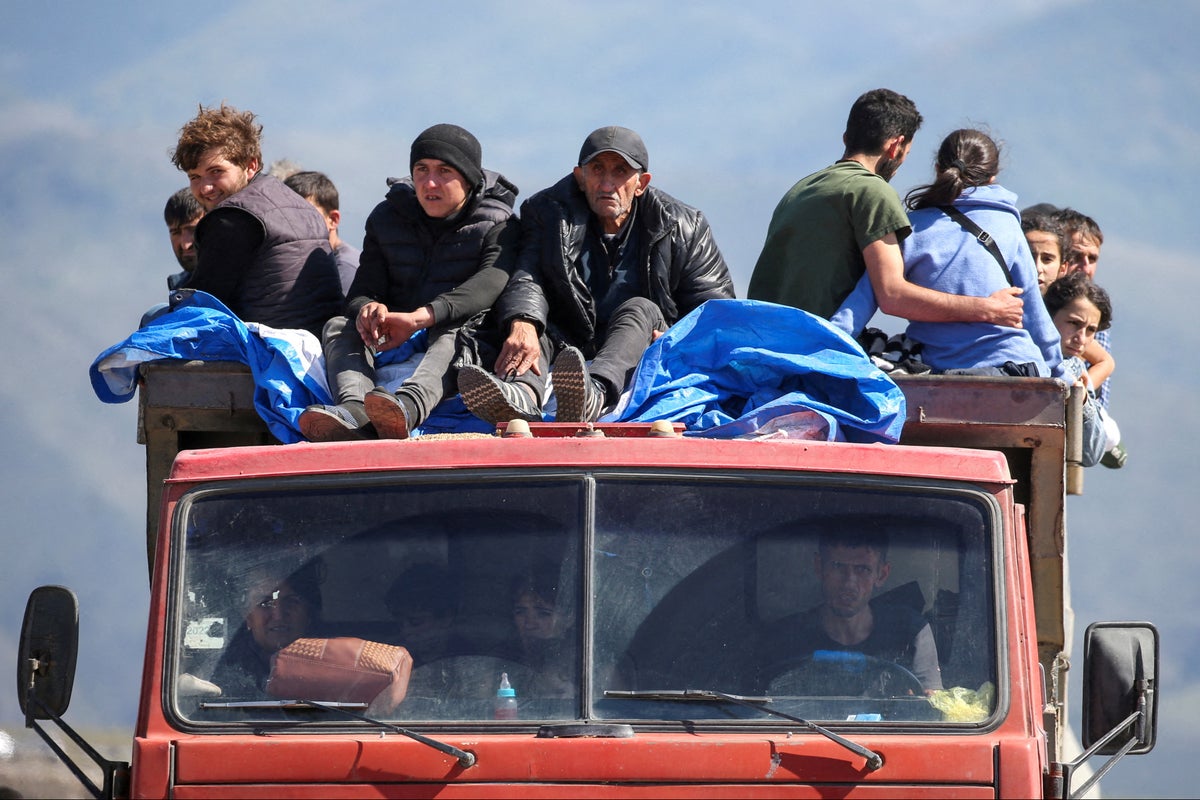
The last bus carrying ethnic Armenians has left Nagorno-Karabakh, bringing an end to an extraordinary exodus of more than 100,000 people since control of the region was retaken by Azerbaijan.
Fifteen passengers with serious illnesses and mobility problems were aboard the bus as it left the breakaway enclave, said Gegham Stepanyan, Nagorno-Karabakh’s human rights ombudsman.
Armenian authorities said that 100,514 people – or 85 per cent of residents – have crossed into Armenia from Nagorno-Karabakh, which is recognised internationally as a part of Azerbaijan but has operated as a de facto state for several decades following a war in the wake of the collapse of the Soviet Union.
As the last buses left, videos emerged showing eerily deserted streets inside the main city of Stepanakert, or Khankendi as it is known in Azerbaijan.
Empty prams, baby cots, children’s scooters and chairs are shown scattered across the main street, where tens of thousands of people had gathered waiting for buses and cars. Azerbaijani police checkpoints have been set up on the city’s edges, and Russian peacekeeping troops are still manning their bases on the outskirts.
Former residents who had fled in recent days told The Independent it was a “ghost town”.
“We don’t know what will happen now,” said Lusine Barkhudaryan, a former member of the self-declared government, who had reached the Armenian border town of Goris. She said she only knew a handful of people who had stayed behind, mostly the elderly as they had nowhere to go.
“We can’t go back. All the things we created for decades have gone.”
The main square in Stepanakert, or Khankendi, in Karabakh— (Al Jazeera/YouTube)
Thousands have been killed during more than 30 years of bloody conflict, which has seen families on both sides displaced.
Ten months ago, the government in Baku, Azerbaijan’s capital, imposed a crippling siege on the enclave, restricting access to food, fuel and electricity. Then, on 19 September, Azerbaijani forces launched a 24-hour military blitz. Outgunned, outnumbered, and weakened by the blockade, the separatist forces capitulated and agreed to dissolve their government by the end of the year.
Baku has pledged to respect the rights of ethnic Armenians in Nagorno-Karabakh as it is reintegrated into Azerbaijan. But the majority of them have fled, fearing persecution including losing the freedom to use their language and to practice their religious and cultural customs.
The arrest of several Karabakh Armenian political and security officials by Azerbaijan – including one of the former prime ministers, Ruben Vardanyan, as he tried to cross into Armenia – only increased the panic.
Mr Vardanyan’s family released a statement on Monday saying they had not been able to communicate with him since his arrest. They called on the international community to help.
Prams and trolleys are abandoned in the street where residents waited to board buses— (Al Jazeera/YouTube)
“We are concerned about his health and arbitrary treatment and have not been able to communicate with him since his capture,” the statement read.
“We fear for his wellbeing and risk to his life.”
Azerbaijani prosecutors have also issued an arrest warrant for the former leader of Nagorno-Karabakh, Arayik Harutyunyan, who led the region before stepping down at the beginning of September.
In a speech on Monday, Azerbaijan’s president Ilham Aliyev said his country had “put an end to the conflict”.
“We protected our dignity, we restored justice and international law,” he added.
Mr Aliyev said: “Our agenda is peace in the Caucasus, peace in the region, cooperation, shared benefits – and today, we demonstrate that.”
The Armenian prime minister, Nikol Pashinyan, has said the exodus of ethnic Armenians from Nagorno-Karabakh amounts to “a direct act of ethnic cleansing and depriving people of their motherland”.
On Thursday, Armenia’s envoy to the EU urged the bloc to sanction Azerbaijan for its operation in the Nagorno-Karabakh enclave, and warned that Baku could soon attack Armenia itself unless the West takes firm action.
Tigran Balayan listed possible measures, such as a price cap on Azerbaijani oil and gas and the suspension of EU talks on closer relations with Baku. In an interview with reporters, he also urged the West to deliver “bold” security assistance to Armenia.
“It’s not only the opinion of the Armenian government, but also of many experts – also some of the EU member states – that an attack on Armenia proper is imminent,” Mr Balayan said.







